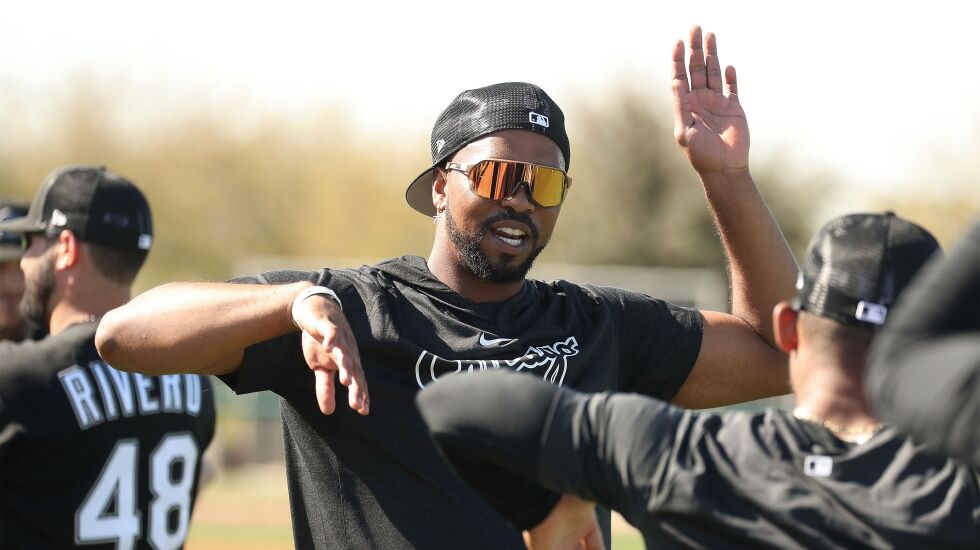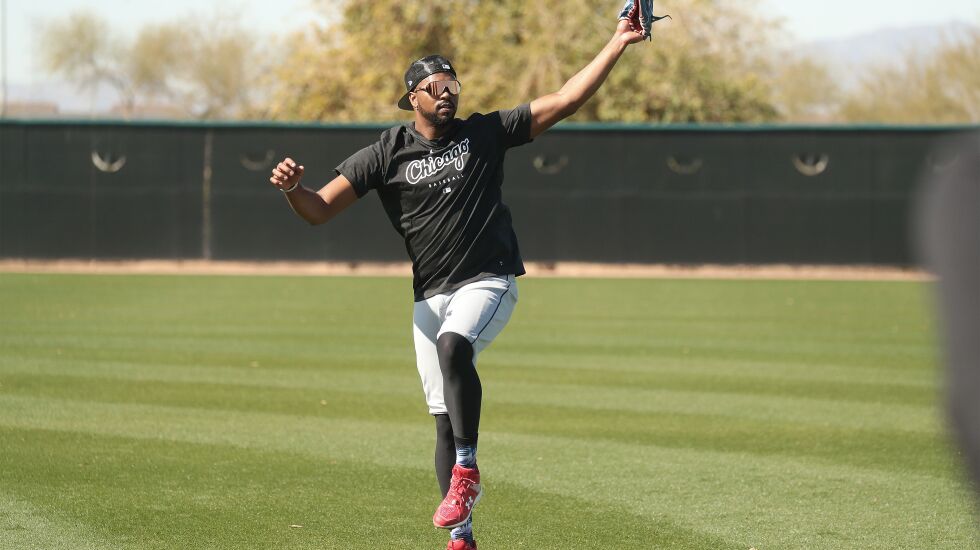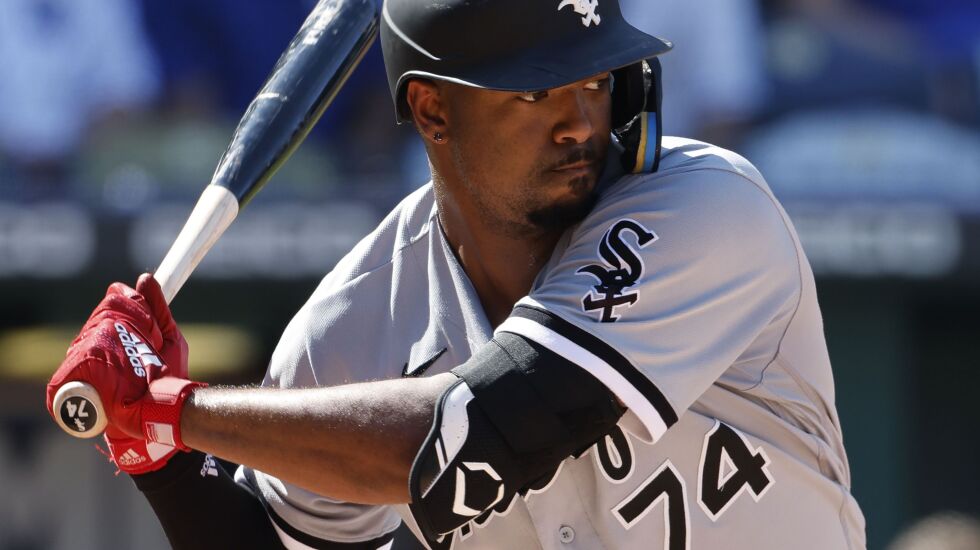
At his first White Sox fan festival, in 2018, Eloy Jimenez — still more than a year out from the big leagues, still only 21 — swung for the fences as he predicted his career path.
With a charming, ever-so-slightly mischievous smile, he spoke of being an All-Star as a rookie and every season after that, of quickly and firmly establishing himself as one of the best young players in the sport and of becoming an MVP and then doing that again, too. He was going to be a superstar, in other words, and as for the Sox? With him in the middle of the lineup, of course they were going to become World Series champions.
Perhaps you’re aware: None of it has happened yet.
Not that Jimenez hasn’t been good or, at times, even better than that. He homered 30 times and knocked in 79 runs in 122 games in 2019, finishing fourth in the voting for American League Rookie of the Year. He hit .296 with 14 homers and 41 RBI in 55 games in the abbreviated 2020 season, winning a Silver Slugger award.
But as Sox fans know all too well, injuries broke apart his next two seasons, leaving what he did on the field in each looking like the sorrier piece of a wishbone. Heading into his fifth go-round with the South Siders, Jimenez, now 26, has played in fewer than 60% of their games, missing a total of 230. His 71 career homers and 211 RBI look almost puny compared to what could have been.
Does Jimenez worry at all that his shot at superstardom is beginning to slip away?
“No,” he says, “and I don’t put any stress in my head about that because I know I’m still young, I know what I can do and I’m really working for that. So I know I’m going to have time to [get] my numbers and to do anything I want to do in this game.”
And what might be the No. 1 thing in that department, just so we’re all on the same page?
“MVP is my goal, one day, to get that trophy,” he says. “That’s my goal right now besides winning a World Series. Top of my list.”
What about the Sox’ so-called championship window, then? By all signs, the opening is shrinking and maybe not all that slowly. After the Sox’ disastrous 2022, sportsbooks project them to be a slightly-above-.500 team in 2023.
“We had a team to win it all, and that’s pretty much what this is [still] about — win it all,” Jimenez says. “I know we’ve got time, but right now is the time, you know what I’m saying? I feel like right now, this is the time because we’ve still got such a good team, such good talent, and I know if we can come together, we can win it all. . . .
“We don’t have any doubt right now. We just want to play, and I’m just really excited for what we have right now. Expectations are expectations, but you create what you really want to happen. We’re working for us because we know we can do it.”
But what about Jimenez’s happiness?
His smile, his joyfulness, his natural friendliness — that stuff doesn’t grow on trees, you know.
How much disappointment along his big-league path can he take before things turn?
Maybe a lot. After he ruptured his left pectoral tendon in a collision with an outfield wall nearing Opening Day in 2021, he wallowed for three or four days, feeling sad, feeling bitter — he’d been anticipating a -giant season at the plate — and asking himself, “Why me?” But then he fired himself up to make a mockery of a potentially season-ending prognosis.
“I took it as a challenge that God gave me and [refused to] hang my head down,” he says. “I was like, ‘If I can [play in 2021], I can impact so many people; they’re going to feel like Eloy had that injury but never stopped.’ For me, that was a challenge that I took as a man. It was not for me only, but it also was for all the people — back [in the Dominican Republic], here, everywhere — who were watching.”
Four months later, he was back in the lineup with the playoff-bound Sox. But he was sent off the rails again in April 2022 by a hamstring injury that would cause him to miss 11 precious weeks of action as the listless Sox drifted aimlessly without him. This setback hit him harder — how could it not have? — but soon enough, he resolved to get over it and stay over it.
“I got my surgery, and my mentality was the same,” he says. “People are out there watching you, so the more time you spend crying or feeling bad for yourself, the more you’ll have to wait to show people what you can do about it. I started to feel better and started to feel mentally tough again.”

But further disappointment might be coming in the form of a role as the team’s primary designated hitter, which Jimenez simply does not wish to be. The Angels’ Shohei Ohtani is the only regular DH to win an MVP award, but — whoa — he pitches, too, and not too shabbily at that. As spring training got rolling, the tea leaves said Jimenez — who shed significant weight in the offseason in an effort to compete for a spot in right field — was going to be the odd man out as a position player.
Injuries are one thing. Feeling rejected, in a sense, or demoted is another. New manager Pedro Grifol says healthy communication with Jimenez will be what matters, but expecting Jimenez to accept without blowback or resentment that he just plain doesn’t cut it with his glove — no matter how clear that might be to those who’ve watched him try — is a big ask.
“Maybe this is for now,” Jimenez says, “but that’s not going to be [the case] for life. Because if you’re working and you have a purpose in what you want to do, people can expect whatever they want or say whatever they want, but you create your own future. If you want to be a DH, you create that. If you want to be outfield, you create that.”
When Jimenez was 19, Baseball Prospectus described his defense as “raw, but there is enough athleticism to become league-average. This is an elite prospect with a high ceiling and a realistic path to a first-division career as a corner outfielder.” After the Sox acquired him in a 2017 trade with the Cubs, general manager Rick Hahn lauded the excellent hitter’s “diverse skill set,” seemingly referring in part to his defense. Former Sox manager Rick Renteria once went so far as to say — with a straight face, no less — that Jimenez could someday win a Gold Glove.
Perhaps you’re aware: That hasn’t happened, either.
But a happy Jimenez probably is a necessity for this Sox team. For one thing, he is a major influence on franchise cornerstone Luis Robert Jr.; the center fielder says Jimenez counsels him in a similarly helpful manner to the departed Jose Abreu, who was renowned for his leadership.
“He always helps me, gives me advice, tells me to have my mind in the right place and to have confidence in myself and my abilities,” Robert says. “He has all those qualities — just like ‘Pito’ — and is very important to me.”
For another, Jimenez is unafraid to address — and wants to bury — what held the Sox back last season most of all: the team not really being a team at all. Jimenez notes the division-winning Guardians as a collection of players who clearly, palpably played for one another. Under manager Tony La Russa, the Sox were very different.
“Every time we had good communication, everybody was on the same page, and we [got] results, we won,” he says. “When we didn’t have that kind of communication, everybody noticed, and something bad happened. It wasn’t about roles, but it was about everybody [being] in the same clubhouse. Sometimes we would talk just when the game started. It felt like everybody was on their own. That’s not good. That has to change.”
Forget bold predictions
Forget feelings, too. The bottom line is Jimenez can — even if he hasn’t done so to the tune of jaw-dropping numbers yet — hit the hell out of a baseball. He easily is among the most talented hitters on the Sox and might be the best one they have. He’s a pure hitter, one who looks like he’s going to do heavy damage every time he stands in the batter’s box, and if that’s a gift, well, it’s the very one the Sox need most from him.
That goes for this season and beyond.
First-year hitting coach Jose Castro forecasts “30, 40 bombs” from Jimenez this season as long as he can stay healthy.
Robert calls him “the whole package as a hitter.”
Grifol calls him “one of the best hitters in baseball.”

Shortstop Tim Anderson, a former AL batting champion, says the best pure hitter in all of baseball is . . . Tim Anderson.
“Why would I say anybody else?” Anderson says, laughing. “I’m my biggest fan. I root for me before I root for any other guys, especially guys on other teams.
“But, yeah, Eloy? Damn. That’s a pure hitter. He takes such good at-bats. You see it. You see it in that guy. You’ve just got to watch. As long as he stays in the lineup, I think he could be MVP.”
Jimenez watches videos of Barry Bonds and considers him the greatest hitter of all time. What some see in Jimenez, he sees in the game’s all-time home-run leader — a man in the box who always looked like he was about to crush a ball into orbit. Jimenez sees something similar in Robert, too, as well as Anderson. He watches Anderson and always assumes a line drive is coming.
But he expects such things from himself, too. When he’s healthy and his confidence is high, he knows he can carry the Sox.
“When it’s like that, it’s special,” he says. “You don’t have any words to describe how that feels. Maybe I’ll say it’s a moment that you never want to leave. It feels so good. You wake up, you go to the ballpark and you just enjoy every single moment when you’re [going] good because this game is up and down all the time. But when you feel good, you just want to stay in this moment and be there forever.”
Like he’s 10 feet tall. Like he has never been injured. Like he’s too good to be criticized or diminished. Like he’s an All-Star and an MVP. Like no one on the planet is better.
Every now and then, Jimenez thinks back to when the Cubs traded him. Goodness, it shocked him. The Cubs were his favorite team when he was a kid. Blue was his favorite color. Wrigley Field was home to his fondest dreams. But then the Cubs decided they didn’t need him — that’s how it felt — and, after a few days, he got over it. He made a promise to himself to love the Sox even more.
Years later, that hasn’t changed. It could be that all he needs is a great season — the one he has been waiting for — to make everything right in his world. Thirty homers? Forty? More?
“I believe in myself,” he says.
He always has.






